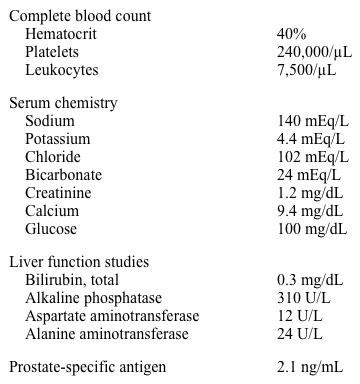A 65-year-old man comes to the physician for evaluation of a recent x-ray abnormality. Three months ago, he experienced a mild episode of diverticulitis. An abdominal film at that time revealed an abnormality in the pelvis. His diverticular disease has abated and he presents for follow-up. The patient occasionally has some mild aching pain in his left hip and groin area that he attributes to arthritis. He has chronic low back pain that is worse on arising in the morning and improves after ambulation.
The patient has had no fever, chills, or weight loss. He gets up to urinate about three times a night and says that his urine stream isn't what it used to be. He has intermittent gastroesophageal reflux and hypertension. His current medications include lisinopril, lansoprazole, ibuprofen, baby aspirin, and a multivitamin.
The patient appears healthy on examination. His temperature is 36.9 C (98.5 F) , blood pressure is 138/88 mm Hg, pulse is 72/min, and respirations are 14/min. BMI is 29 kg/m2. His general examination is within normal limits. Digital rectal examination shows normal sphincter tone and a mildly enlarged soft prostate. There is good range of motion of his hips. There is limited range of motion of his back. He has no motor or sensory deficits of his lower extremities, and reflexes are 2+ and symmetrical.
Laboratory results are as follows:
A review of the x-rays reveals thickening of the femoral neck and diffuse sclerosis of bone that is most prominent in the left hemi-pelvis.
Which of the following would be the most appropriate next step?
Definitions:
Phylogeny
The evolutionary history and relationship among species or groups of organisms, often illustrated as a tree-like diagram showing divergent lines of descent.
Ecdysozoans
A major group of invertebrate animals including arthropods and nematodes, defined by their shared trait of molting an exoskeleton (ecdysis).
Unique Adaptation
A distinctive or specialized feature, structure, or behavior developed by an organism to improve its chances of survival and reproduction in its environment.
Insects
A class of arthropods, characterized by a three-part body (head, thorax, abdomen), three pairs of legs, compound eyes, and two antennae.
Q61: A 35-year-old man comes to the office
Q73: Biologists observed that as the temperature t
Q122: The table below illustrates a set of
Q124: Write <img src="https://d2lvgg3v3hfg70.cloudfront.net/TBX8673/.jpg" alt="Write as
Q131: A 66-year-old man comes to the office
Q250: A 23-year-old man comes to the office
Q267: The temperature (in ° F) of a
Q453: A 62-year-old man comes to the physician
Q786: A 27-year-old woman, gravida 1 para 0,
Q788: A 72-year-old man comes to the physician